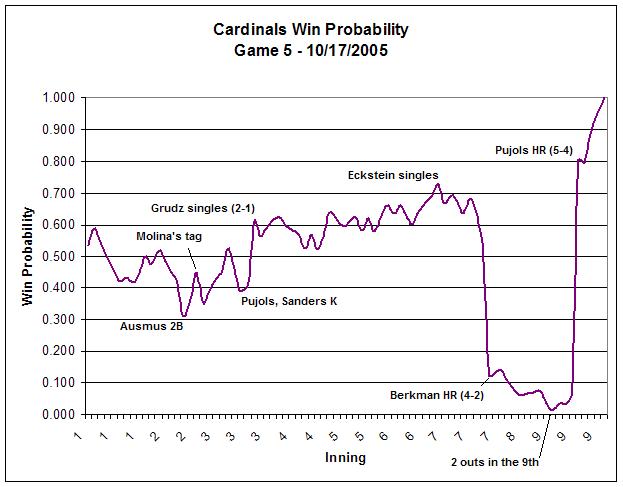Pujols Carries Cards to St. Louis
“Kiner can wipe out your lead with one swing.” – Warren Spahn, on Ralph Kiner
That’s probably what Brad Lidge is saying about Albert Pujols about now. One swing was all it took to ruin a storybook moment for Astros fans. After all, Nolan Ryan was in attendance, Astros stalwarts George H.W. Bush and Barbara were ready, it was the 45th anniversary of the date that Houston was awarded a National League franchise—a franchise that had never tasted a World Series after eight appearances in the postseason and several crushing blows (most notably the 1980 NLCS versus the Phillies). All of Texas was ready to celebrate its first World Series.
But then Lidge hung a slider and we’re heading back to St. Louis for Game 6 on Wednesday as the Cardinals won 5-4.
My colleague Brian Guinn has provided an excellent analysis of Game 5; as THT has done for many of the postseason games, I’ll take a look at it from a Win Probability perspective.
For the Astros, the biggest play early in the game was no doubt the Brad Ausmus double down the left field line in the second inning that followed a Jason Lane single and put runners at second and third with nobody out. That played raised their win probability by 10.4%, to 69%. However, the Adam Everett strikeout followed by the grounder to first that resulted in a great backhanded tag by Yadier Molina to nail Ausmus at the plate plummeted their chances 14%. But moments later, Craig Biggio’s single scoring Lane shot them back up 9.9% to 64.9% and put the Astros in front 1-0.
In the top of the third, the Cardinals almost failed to capitalize on singles by David Eckstein and Jim Edmonds, as Pujols and Reggie Sanders, both struck out which combined to lower the Cardinals’ win probability by 13.6% to 38.7%. However, a Mark Grudzielanek flare that plated both runners gave the Cardinals their 2-1 lead and caused a 19.3% swing—the biggest play of the game before the late-inning home run heroics by Lance Berkman and Pujols.
The Cardinals almost added to their lead in the 7th by taking advantage of two Astros errors courtesy, of Everett and Mike Lamb, but failed to capitalize when Eckstein, apparently thinking he had read Andy Pettite’s move earlier in the game when he stole second without a throw, took off for second and was picked off, registering a 6.2% drop for the Cardinals.
But of course the heroics for the Astros started in the bottom of the 7th when Biggio reached on an error (+5.3%) by Hector Luna with one out and Chris Burke-tober grounded a single to right on a hit and run (+13.2%). The stage was then set for Berkman’s line drive into the Crawford boxes that gave the Astros their 4-2 lead and raised their win probability by 37.3% to 87.6%. In the span of three plays, the Cardinals chances went from 62.9% to 12.4%, and Berkman was set to wear the mantle of hero.
By the time the 9th inning rolled around, Lidge was on the mound following a good inning by Chad Qualls and Dan Wheeler and the Cardinals were sitting at 7.6%. After making quick work of John Rodriguez and John Mabry, Lidge had driven the Cardinals’ chances to just 1.2%. Eckstein’s two-strike single (2.4%) and Edmonds five-pitch walk (3.6%) crept them back to 7.3%. Normally, I would think that 7.3% in that situation is generous, especially with a pitcher the caliber of Lidge on the mound. However, with Pujols at bat that probably was about right.
The 0-1 hanging slider, however, that would have been a homerun in any park registered on the win probability chart like a seismic event, raising the Cardinals win probability an amazing 73% to 80.3%. Jason Isringhausen then closed the door in the 9th and put the Astros in a “state of Missouri” (ok, not original but still funny right?).
For the game the it’s no surprise that Pujols led all players in win probability added at .580, while Isringhausen was second for the Cardinals at .222 since, he recorded the most highly leveraged six outs of the game. On the negative side of the ledger, Chris Carpenter pitched well, giving up just three earned runs in 7 innings, but as the victim of Berkman’s blast he was credited with a -.276 WPA. For the Astros, Berkman came out on top at .424 (he also had a walk, single, and threw out Grudzielanek at second on a single leading off the 6th), while Lidge took the fall at -.717.
The complete graph with the very big highs and very low lows can be seen below.
